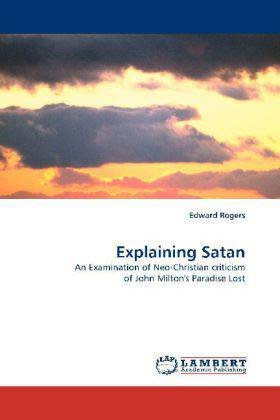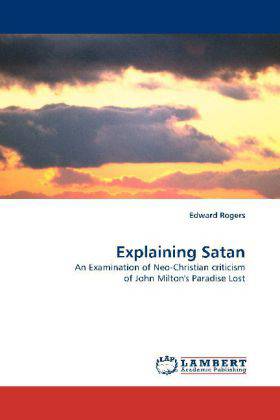
Je cadeautjes zeker op tijd in huis hebben voor de feestdagen? Kom langs in onze winkels en vind het perfecte geschenk!
- Afhalen na 1 uur in een winkel met voorraad
- Gratis thuislevering in België vanaf € 30
- Ruim aanbod met 7 miljoen producten
Je cadeautjes zeker op tijd in huis hebben voor de feestdagen? Kom langs in onze winkels en vind het perfecte geschenk!
- Afhalen na 1 uur in een winkel met voorraad
- Gratis thuislevering in België vanaf € 30
- Ruim aanbod met 7 miljoen producten
Zoeken
Explaining Satan
An Examination of Neo-Christian criticism of John Milton's Paradise Lost
Edward Rogers
Paperback | Engels
€ 69,45
+ 138 punten
Omschrijving
Paradise Lost is a paradox. In the poem, God is a trickster, a sadist, the creator of pain, while Satan and his minions appear heroic and noble. Two and a half centuries of criticism ignore these blasphemies and heresies but modern critics cannot. How, they ask, could this great Puritan bible scholar, author of De Doctrina Christiana, have created this attractive and charismatic Satan? Twentieth-century criticism of Milton s epic poem has focused on clearing up these contradictions and rehabilitating Milton as a Christian; in this process they do the poet and the work a disservice. Paradise Lost is not a Sunday school lesson. In Professor Rogers' book the ambiguities are restored, and the critics are criticized.
Specificaties
Betrokkenen
- Auteur(s):
- Uitgeverij:
Inhoud
- Aantal bladzijden:
- 76
- Taal:
- Engels
Eigenschappen
- Productcode (EAN):
- 9783838308982
- Verschijningsdatum:
- 31/08/2009
- Uitvoering:
- Paperback
- Afmetingen:
- 152 mm x 220 mm
- Gewicht:
- 122 g

Alleen bij Standaard Boekhandel
+ 138 punten op je klantenkaart van Standaard Boekhandel
Beoordelingen
We publiceren alleen reviews die voldoen aan de voorwaarden voor reviews. Bekijk onze voorwaarden voor reviews.









